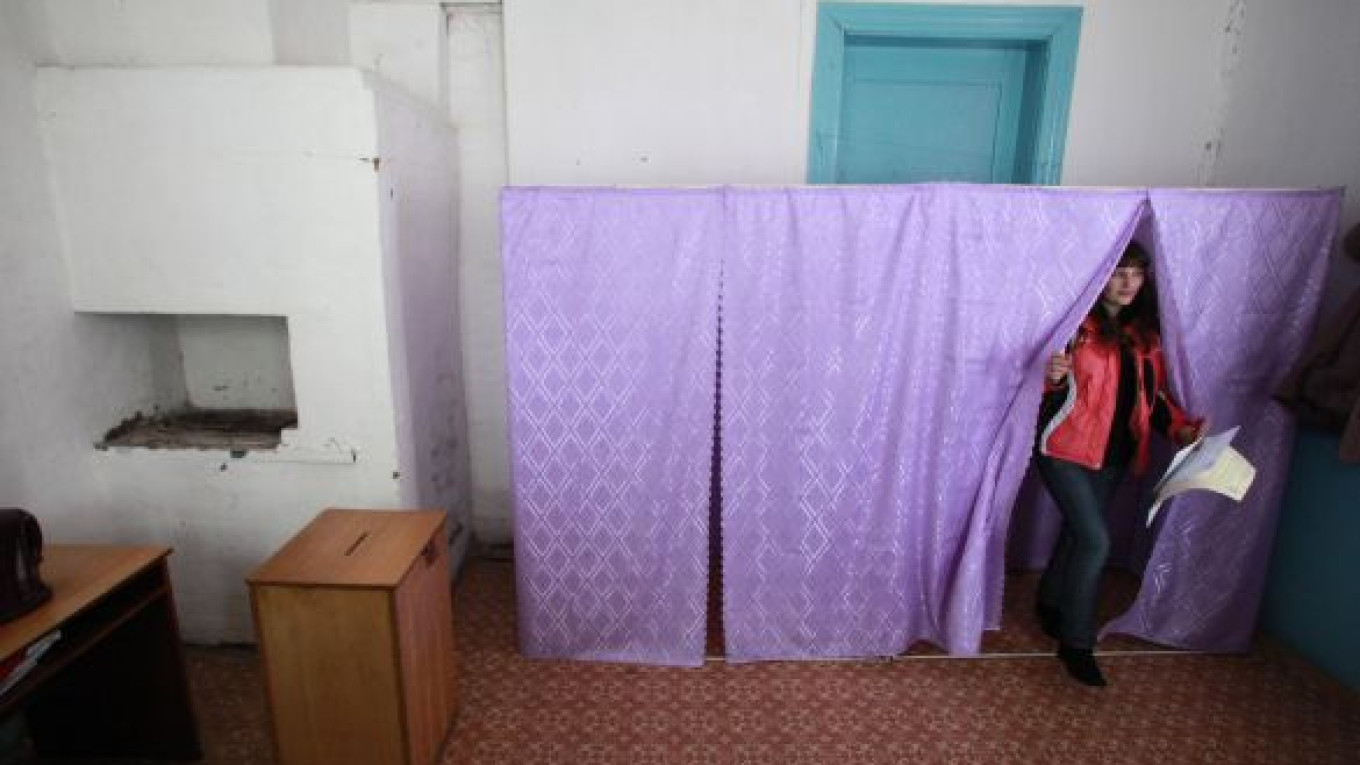Early official figures indicated a high turnout Sunday in elections that are seen as a test of President Dmitry Medvedev's commitment to democracy.
The Central Election Commission also touted the elections — which included eight regional legislatures and 12 municipal legislatures — as going more smoothly than the last major vote in October, which opposition parties and independent observers denounced as fraudulent after United Russia won by a landslide.
Although Medvedev in January urged regional authorities to let people vote freely, all indications going into Sunday's elections suggested that United Russia would trounce all other parties once again.
Results in the elections were expected Monday.
Turnout in the Khabarovsk region, which voted for a new legislature, was a relatively high 40 percent, the Central Election Commission said on its web site.
In the city of Irkutsk, which voted for mayor, the preliminary turnout was 23.3 percent, or 5 percent higher than in the last mayoral election in 2005, it said.
The Central Election Commission said it had received nearly 50 percent fewer complaints about the pre-election campaign in comparison with October.
Observers at polling stations reported only minor technical violations, mostly connected to illegal campaigning on election day and early voting, it said.
But Yury Dzagania, first secretary of the Communist Party's branch in Sochi, suggested that any lack of complaints was linked to widespread apathy.
"It seems residents have already lost their interest in the elections because they know that everything has been decided already," Dzagania told The Moscow Times by telephone from Sochi, which voted for a city legislature.
The Communist Party has complained about numerous violations in early voting in Sochi, which will host the 2014 Winter Olympics. Under electoral reforms initiated by Medvedev after last fall's disputed elections, early voting will be banned in elections after Sunday's.
In Sochi, almost 10.5 percent of all voters — or 30,250 people — cast their votes early, Dzagania said. About 292,550 voters live in Sochi, according to the city's election committee.
In total about 6,000 elections for various levels of government were held Sunday across the country. About 84,000 candidates ran for about 40,000 open seats.
Police reported no serious violations during the elections.
In a minor incident, a 75-year-old pensioner attacked a police guard who tried to prevent him from carrying a ballot away from a polling station in the Sverdlovsk region, Interfax reported.
On election day, Central Election Commission chief Vladimir Churov visited Ryazan, where he said the largest percentage of violations had been reported ahead of the elections. But only 5 percent of the complaints were later confirmed, he said Sunday, Interfax reported.
United Russia observers complained Sunday that a group of people was distributing vodka and sausages from a car decorated with Liberal Democratic Party posters near a polling station in Ryazan.
"It was a clear provocation," Churov said Sunday, Interfax reported. "Unfortunately, my dream that every political strategist is dead hasn't come true yet."
He added that the death of all political strategists would end all political conflicts worldwide.
A Message from The Moscow Times:
Dear readers,
We are facing unprecedented challenges. Russia's Prosecutor General's Office has designated The Moscow Times as an "undesirable" organization, criminalizing our work and putting our staff at risk of prosecution. This follows our earlier unjust labeling as a "foreign agent."
These actions are direct attempts to silence independent journalism in Russia. The authorities claim our work "discredits the decisions of the Russian leadership." We see things differently: we strive to provide accurate, unbiased reporting on Russia.
We, the journalists of The Moscow Times, refuse to be silenced. But to continue our work, we need your help.
Your support, no matter how small, makes a world of difference. If you can, please support us monthly starting from just $2. It's quick to set up, and every contribution makes a significant impact.
By supporting The Moscow Times, you're defending open, independent journalism in the face of repression. Thank you for standing with us.
Remind me later.


